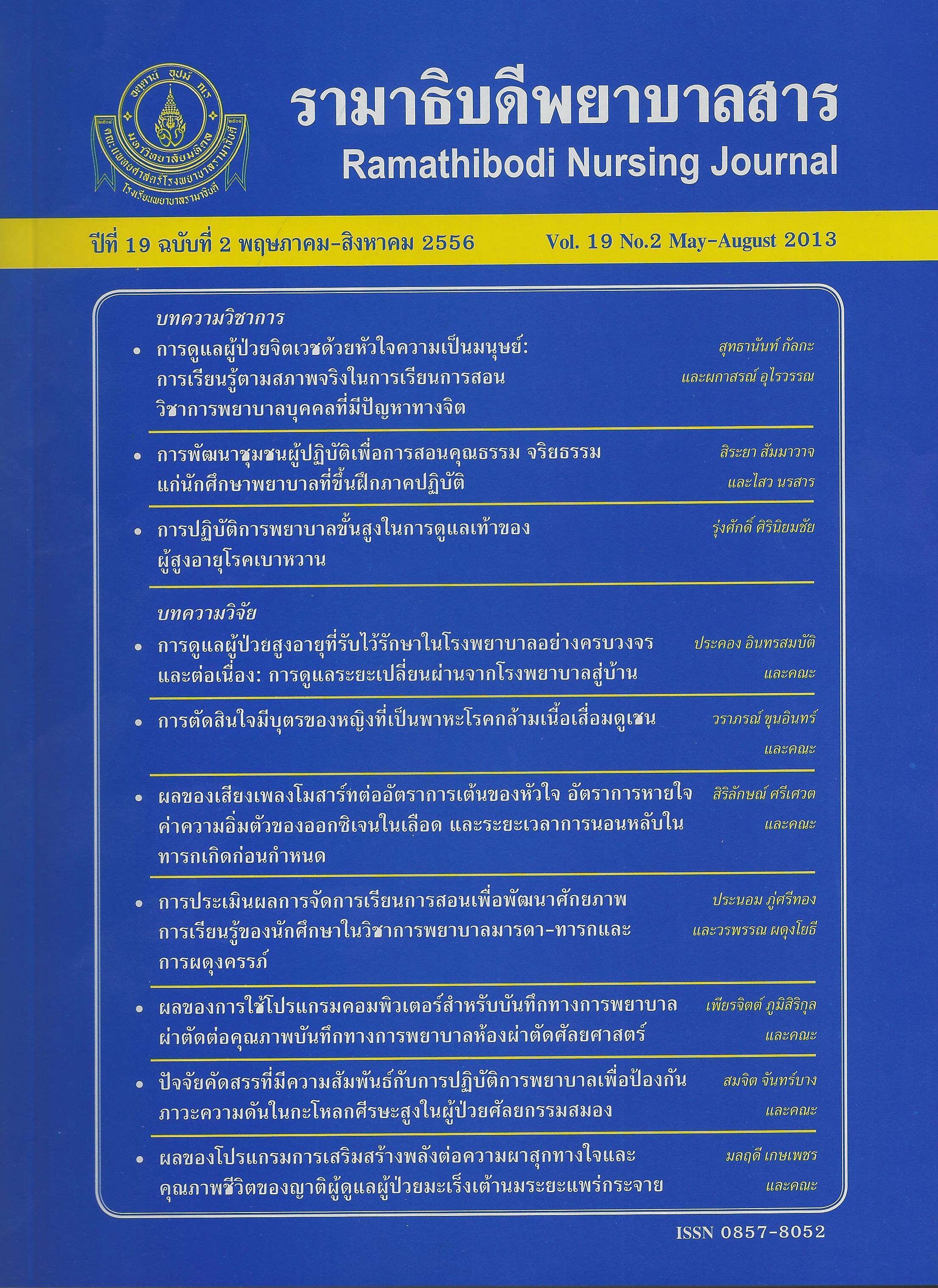การดูแลผู้ป่วยจิตเวชด้วยหัวใจความเป็นมนุษย์: การเรียนรู้ตามสภาพจริงใน การเรียนการสอนวิชาการพยาบาลบุคคลที่มีปัญหาทางจิต
Main Article Content
Abstract
บทคัดย่อ
การเรียนรู้ตามสภาพจริงในการดูแลผู้ป่วยจิตเวชด้วยหัวใจความเป็นมนุษย์ เป็นส่วนหนึ่งของการเรียนการสอนรายวิชาการพยาบาลบุคคลที่มีปัญหาทางจิต โดยมีวัตถุประสงค์เพื่อให้นักศึกษาศึกษาวิถีชีวิตของผู้ป่วยจิตเวช ครอบครัว และชุมชน และเรียนรู้การให้พยาบาลบุคคลที่มีปัญหาทางจิตด้วยหัวใจความเป็นมนุษย์ การดำเนินการประกอบด้วย 6 ขั้นตอน ขั้นตอนที่ 1 เตรียมนักศึกษาให้มีพื้นฐานการดูแลผู้ป่วยจิตเวชด้วยหัวใจความเป็นมนุษย์ ขั้นตอนที่ 2 ทบทวนประเด็นความรู้เรื่องการสร้างสัมพันธภาพเพื่อการบำบัด/การสื่อสาร/บทบาทของพยาบาลจิตเวชในการทำความเข้าใจมนุษย์/การดูแลเรื่องยา/การให้คำแนะนำผู้ป่วยและครอบครัว/จิตเวชชุมชน ขั้นตอนที่ 3 นักศึกษาสัมภาษณ์ผู้ป่วยจิตเวชและครอบครัวเกี่ยวกับปัจจัยที่เกี่ยวข้องและผลกระทบจากการเจ็บป่วยทางจิต การจัดการกับปัญหาทางจิต และการมีส่วนร่วมของครอบครัวในการดูแลผู้ป่วยทางจิต ขั้นตอนที่ 4 นักศึกษานำเสนอข้อมูลในกลุ่มย่อย ขั้นตอนที่ 5 นักศึกษานำเสนอข้อมูลในกลุ่มใหญ่ และขั้นตอนที่ 6 สะท้อนคิดและสรุปบทเรียนจากการศึกษาวิถีชีวิตผู้ป่วยจิตเวชบนพื้นฐานการดูแลด้วยหัวใจความเป็นมนุษย์ ประเมินผลโดยนักศึกษาและอาจารย์สรุปได้ว่า การเรียนรู้ตามสภาพจริงในการเรียนการสอนวิชาการพยาบาลบุคคลที่มีปัญหาทางจิตทำให้นักศึกษามีความสามารถในการบริการด้วยหัวใจความเป็นมนุษย์ ดังนั้น จึงมีความสำคัญที่ควรมีการจัดการเรียนการสอนแบบเรียนรู้จากสภาพจริงอย่างต่อเนื่องเพราะทำให้นักศึกษาเห็นสภาพผู้ป่วย เห็นบริบทของผู้ป่วยและครอบครัวตามความจริง เห็นบทบาทของพยาบาลจิตเวช และสามารถเชื่อมโยงกับทฤษฎีได้มากขึ้น
คำสำคัญ: ผู้ป่วยจิตเวช หัวใจความเป็นมนุษย์ การเรียนรู้ตามสภาพจริง การดูแล ปัญหาสุขภาพจิต
Abstracts
Authentic learning in caring for psychiatric patients with humanized care was a part of the course of nursing care for people with mental health problems. The purpose was to provide students to explore the way of life of psychiatric patients, families, and community, and learn how to care for people with mental problems with the humanized care concept. The activity consisted of six steps. The first step was to prepare students to have basic psychiatric care with humanized care. The second step was to review the knowledge about making therapeutic relationship/communication/roles of psychiatric nurses in understanding human/managing medication/providing advice to psychiatric patients and their families/community psychiatry. The third step was to have students interview patients and their families about related factors and impacts of psychiatric illness, management of psychiatric problems and family participation in caring for psychiatric patients. The fourth step was to have students present data in a small group. The fifth step was to have students present data in a large group. And the sixth step was to reflect and summarize what they had learned from studying psychiatric patients’ lives under humanized care. The evaluation by both students and lecturers could be concluded that authentic learning in the course of nursing care of people with mental health problems enabled students to provide service with humanized care. Therefore, it is important to arrange the authentic learning continuously so that students can see the patients’ lives, context of patients and their families, and roles of psychiatric nurses, as well as students could link it with the theory.
Keywords: Psychiatric patients, Humanized care, Authentic learning, Caring, Mental health problems
Article Details
บทความ ข้อมูล เนื้อหา รูปภาพ ฯลฯ ที่ได้รับการตีพิมพ์ในรามาธิบดีพยาบาลสาร ถือเป็นลิขสิทธิ์ของวารสาร หากบุคคลหรือหน่วยงานใดต้องการนำทั้งหมดหรือส่วนหนึ่งส่วนใดไปเผยแพร่หรือเพื่อกระทำการใด ใด จะต้องได้รับอนุญาตเป็นลายลักษณ์อักษรจากรามาธิบดีพยาบาลสารก่อนเท่านั้น


